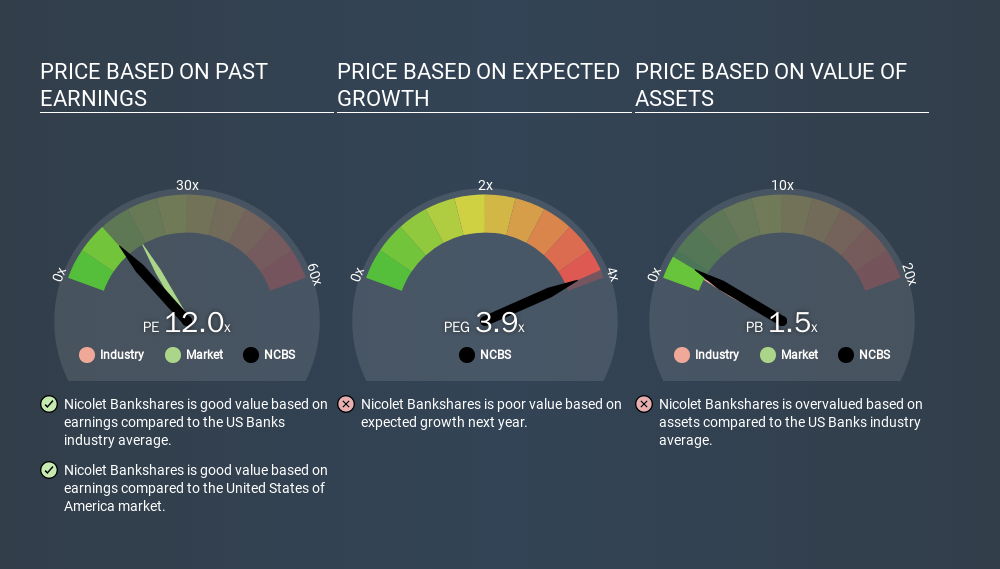Stock Analysis

Today, we'll introduce the concept of the P/E ratio for those who are learning about investing. We'll look at Nicolet Bankshares, Inc.'s (NASDAQ:NCBS) P/E ratio and reflect on what it tells us about the company's share price. Nicolet Bankshares has a P/E ratio of 12.02, based on the last twelve months. In other words, at today's prices, investors are paying $12.02 for every $1 in prior year profit.
See our latest analysis for Nicolet Bankshares
How Do You Calculate A P/E Ratio?
The formula for price to earnings is:
Price to Earnings Ratio = Share Price ÷ Earnings per Share (EPS)
Or for Nicolet Bankshares:
P/E of 12.02 = USD68.68 ÷ USD5.71 (Based on the trailing twelve months to December 2019.)
Is A High P/E Ratio Good?
A higher P/E ratio implies that investors pay a higher price for the earning power of the business. That isn't necessarily good or bad, but a high P/E implies relatively high expectations of what a company can achieve in the future.
How Does Nicolet Bankshares's P/E Ratio Compare To Its Peers?
The P/E ratio essentially measures market expectations of a company. The image below shows that Nicolet Bankshares has a P/E ratio that is roughly in line with the banks industry average (11.9).

Nicolet Bankshares's P/E tells us that market participants think its prospects are roughly in line with its industry. So if Nicolet Bankshares actually outperforms its peers going forward, that should be a positive for the share price. Checking factors such as director buying and selling. could help you form your own view on if that will happen.
How Growth Rates Impact P/E Ratios
Earnings growth rates have a big influence on P/E ratios. When earnings grow, the 'E' increases, over time. And in that case, the P/E ratio itself will drop rather quickly. So while a stock may look expensive based on past earnings, it could be cheap based on future earnings.
Nicolet Bankshares increased earnings per share by a whopping 34% last year. And it has bolstered its earnings per share by 20% per year over the last five years. I'd therefore be a little surprised if its P/E ratio was not relatively high.
Don't Forget: The P/E Does Not Account For Debt or Bank Deposits
Don't forget that the P/E ratio considers market capitalization. So it won't reflect the advantage of cash, or disadvantage of debt. The exact same company would hypothetically deserve a higher P/E ratio if it had a strong balance sheet, than if it had a weak one with lots of debt, because a cashed up company can spend on growth.
Such spending might be good or bad, overall, but the key point here is that you need to look at debt to understand the P/E ratio in context.
How Does Nicolet Bankshares's Debt Impact Its P/E Ratio?
With net cash of US$86m, Nicolet Bankshares has a very strong balance sheet, which may be important for its business. Having said that, at 12% of its market capitalization the cash hoard would contribute towards a higher P/E ratio.
The Bottom Line On Nicolet Bankshares's P/E Ratio
Nicolet Bankshares trades on a P/E ratio of 12.0, which is below the US market average of 16.9. Not only should the net cash position reduce risk, but the recent growth has been impressive. The relatively low P/E ratio implies the market is pessimistic.
Investors have an opportunity when market expectations about a stock are wrong. As value investor Benjamin Graham famously said, 'In the short run, the market is a voting machine but in the long run, it is a weighing machine. So this free visual report on analyst forecasts could hold the key to an excellent investment decision.
Of course, you might find a fantastic investment by looking at a few good candidates. So take a peek at this free list of companies with modest (or no) debt, trading on a P/E below 20.
If you spot an error that warrants correction, please contact the editor at editorial-team@simplywallst.com. This article by Simply Wall St is general in nature. It does not constitute a recommendation to buy or sell any stock, and does not take account of your objectives, or your financial situation. Simply Wall St has no position in the stocks mentioned.
We aim to bring you long-term focused research analysis driven by fundamental data. Note that our analysis may not factor in the latest price-sensitive company announcements or qualitative material. Thank you for reading.
About NYSE:NIC
Nicolet Bankshares
Operates as the bank holding company for Nicolet National Bank that provides banking products and services for businesses and individuals in Wisconsin and Michigan.
Flawless balance sheet with solid track record.

